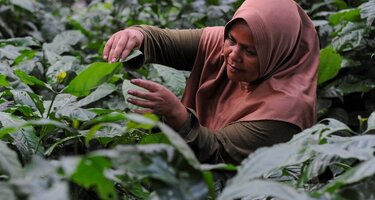Gender equality in the FONAP Member Project
The FONAP member project promotes sustainable oil palm cultivation with a landscape approach in Indonesia. Gender equity in smallholder farming structures is also at the centre of the project. To this end, the project cooperates with local stakeholders in the province of Jambi in Sumatra.
As part of the project activities, three women's groups were encouraged to set up and manage their own tree nurseries. The seedlings grown for trees and shrubs with commercial use (e.g. durian, coffee, candle nut tree) are sold to neighbouring social forestry cooperatives and RSPO-certified producer groups with a mandate to rehabilitate natural areas. Social forestry is a form of forest management that benefits the local population and promotes the regeneration of degraded forests. A joint agreement (Memorandum of Understanding) guarantees the women's groups the sale of their seedlings. In addition, in the nurseries, tree species are grown that can be planted on the riverbanks of local waterways. The planting prevents erosion, helps to improve riverbank protection, and generates income opportunities for the women's groups. Despite their involvement in agricultural supply chains, women often earn little. The project approach supports gender-specific niche production such as tree nurseries and promotes the financial inclusion of women's groups.
Project coordination together with women and men in the village community
In addition, the women's groups are advised on vegetable cultivation for self-sufficiency to enable favourable production conditions and encourage an improvement in the supply of nutrients. The project is coordinated with the local village communities so that everyone, including the men, can be involved and the processes can be jointly organised. As an accompanying measure, issues that otherwise often only affect women, such as childcare, are discussed at community level. Promoting gender-equitable participation in training can contribute to improved production and quality.
What has been achieved so far?
The first phase of the FONAP member project contributed to the support of the KP3 women's group with a total of 70 members and their management of tree nurseries. A total of around 8,000 seedlings were grown ready for planting. The women of KP3 were able to sell these to RSPO-certified smallholder organisations that support the reforestation of palm oil landscapes. The women also sold a further 1,000 coffee and 700 candle nut tree seedlings to social forestry groups. These seedlings are intended to contribute to the restoration of 17 hectares of forest area, which will explicitly allow for defined economic utilisation.
What happens next?
In the second phase of the project, the women's groups are supported in their further professionalisation and their access to new sales markets is opened. In concrete terms, this means expanding the varieties grown and establishing a registered cooperative in which women take on leadership roles as elected representatives. Access to resources and markets and the assumption of leadership roles in producer organisations allows people to benefit from advantages regardless of gender.
More information about the FONAP member project can be found here.
